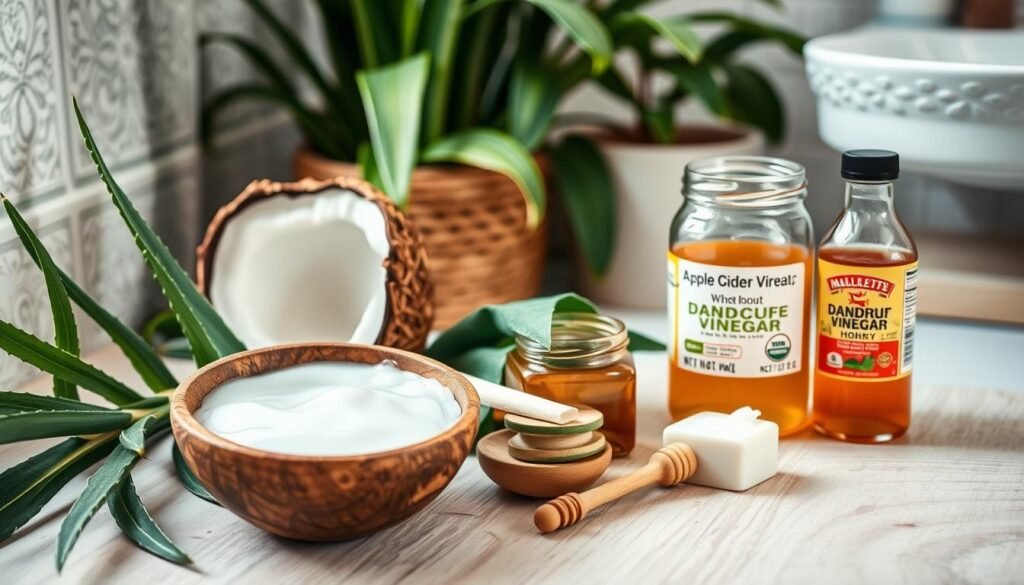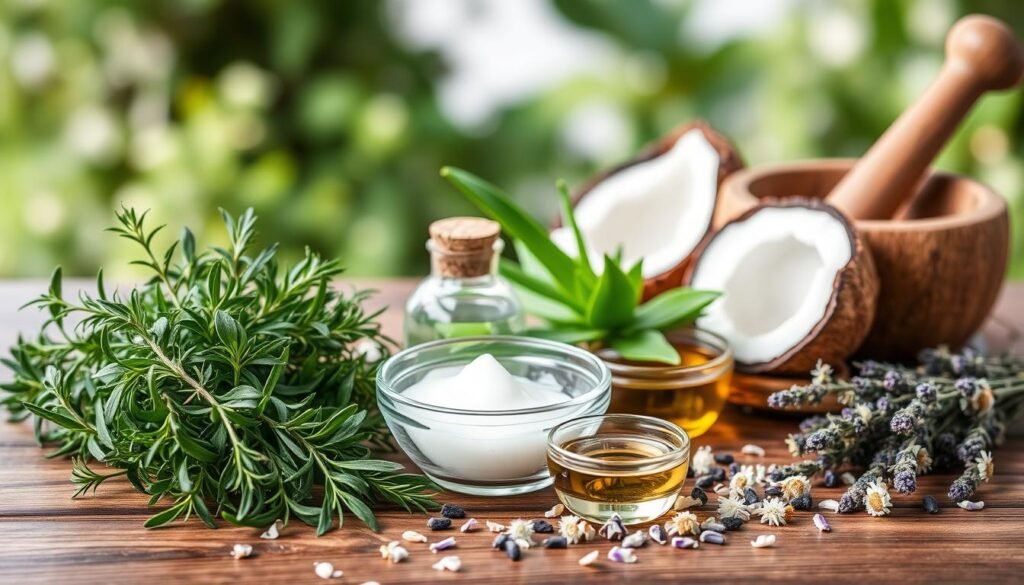Did you know half of the people around the world deal with dandruff at some point? This annoying scalp issue causes flaking and itchiness. But don’t worry, natural remedies can really make a difference. In this article, we’ll show you how to beat dandruff with natural methods. You’ll find out what causes it and learn some easy home remedies. By making some changes to what you eat and trying out these treatments, you can get a healthier scalp without harsh chemicals.
Key Takeaways
- Almost half of people worldwide will face dandruff at least once.
- Natural dandruff remedies can provide effective relief without harsh chemicals.
- Coconut oil and tea tree oil have properties that may help reduce dandruff.
- A healthy diet plays a crucial role in preventing dandruff.
- Effective scalp care and stress management can greatly impact dandruff severity.
Understanding Dandruff
Dandruff is a common issue, affecting nearly half of adults at some point. It shows up as itchy, flaky skin on the scalp. This can be quite uncomfortable. Despite common beliefs, dandruff isn’t just about bad hygiene. It’s a complex condition, influenced by factors like oily or dry skin and medical issues.
Seborrheic dermatitis is a key cause of dandruff. It can appear on the scalp and other body parts. Eczema, scalp irritation, psoriasis, and ringworm also contribute to it. Having a family history of dandruff can make you more likely to get it.
Managing dandruff often starts with regular scalp care. Using gentle shampoo helps reduce oil and dead skin buildup. But when simple steps don’t do the trick, many turn to special dandruff shampoos. These shampoos contain ingredients like ketoconazole and aloe vera, known for their effectiveness.
Switching shampoos can sometimes make them work better. It’s important to choose products that meet your specific needs. Taking good care of your scalp not only helps with dandruff. It also improves hair health significantly.
Common Causes of Dandruff
Many people suffer from dandruff for different reasons. About half of the world’s adults face seborrheic dermatitis, a big cause of dandruff. This problem is seen more in men than women.
Dry skin can cause the scalp to flake, which is a common reason for dandruff. Oilier hair or having certain health issues, like Parkinson’s or HIV, might increase dandruff. Those with these conditions often see more severe symptoms.
Using some hair products can also lead to dandruff. They irritate the scalp. A yeast-like fungus named Malassezia is another culprit. It loves oily skin and causes a lot of flaking.
Season changes affect dandruff too, especially in fall and winter. The air gets drier. Good scalp care, washing your hair the right amount, and stress control can help.
Finding the right dandruff solution starts with knowing the cause. Options include store-bought treatments with special ingredients like ketoconazole or natural ones. You can try things like baking soda, apple cider vinegar, or coconut oil.
How to Get Rid of Dandruff Naturally
Dandruff affects many people, causing discomfort and self-awareness. Knowing how to treat it naturally is key for those avoiding medication. These remedies focus on soothing the scalp and reducing flakes.
Natural Remedies Overview
There are many natural ways to fight dandruff. Ingredients like tea tree oil, coconut oil, and aloe vera are effective. Tea tree oil combats dry scalp with its antifungal qualities. Coconut oil helps with conditions that dry out the scalp.
Aloe vera is a great moisturizer and reduces skin irritation with its anti-inflammatory traits.
Benefits of Using Natural Treatments
Natural dandruff treatments can lead to a healthier scalp without medication’s downsides. These methods have antifungal and anti-inflammatory benefits. For instance, a mix of lemon juice, sea salt, and oil makes a good natural scrub. Apple cider vinegar, too, fights bacteria and rebalances the scalp’s pH.
Choosing natural remedies can yield good results over time. They nurture the hair and scalp, enhancing overall health.
Top Natural Dandruff Remedies
Looking for ways to treat dandruff can lead to better hair health and comfort. Many people prefer natural remedies for their soft yet effective approach. Here, we explore several options that use well-known anti-dandruff elements.
Tea Tree Oil
Tea tree oil is known for its strong antimicrobial and anti-inflammatory effects. It targets the fungus that causes dandruff. It’s important to mix tea tree oil with another oil to prevent irritation before using it on your scalp.
Coconut Oil
Coconut oil is special for its lauric acid, which fights fungus and improves scalp moisture. Using coconut oil regularly can lessen dandruff by fighting dryness and improving hydration. Rubbing a bit into your scalp before a shower works well.
Aloe Vera
Aloe vera is great for calming the scalp with its antibacterial and antifungal properties. It soothes irritation and reduces redness, setting it apart in natural dandruff treatments. Applying the gel to your scalp can lessen itchiness and boost health.

| Remedy | Key Benefits | Application Method |
|---|---|---|
| Tea Tree Oil | Antimicrobial properties, reduces fungus | Dilute with carrier oil and massage into scalp |
| Coconut Oil | Hydrates scalp, antifungal | Massage into scalp, leave for an hour |
| Aloe Vera | Soothes irritation, antibacterial | Apply gel directly to the scalp |
Natural dandruff solutions are great alternatives to standard treatments, especially for those who want gentle yet effective care. Adding these anti-dandruff ingredients to your care routine can make your scalp healthier and flake-free.
Diet Changes for Dandruff Prevention
Changing what you eat can really help your scalp health. Omega-3 fatty acids are key for controlling oil and keeping skin moist, helping to keep dandruff away. Eat more omega-3-rich foods like salmon, avocados, and nuts. However, some foods might make dandruff worse.
Incorporating Omega-3s
Omega-3 fatty acids are good for your skin and can naturally fight dandruff. They keep the skin hydrated and prevent it from drying out. To help avoid dandruff, try eating more foods with omega-3s:
- Fatty fish (salmon, mackerel, sardines)
- Chia seeds
- Flaxseeds
- Walnuts
- Algal oil (a plant-based omega-3 source)
Adding these foods to your diet helps your scalp and may lower dandruff problems.
Foods to Avoid
Eating right plays a role, but avoiding certain foods does too. Foods with a lot of refined carbs and sugars might cause inflammation, making dandruff worse. Try to eat less of the foods listed below:
- Fried foods
- Sweetened beverages
- Refined grains (white bread, pastries)
- Processed snacks
Cutting down on these foods can improve the health of your scalp. For further advice on how diet affects dandruff, check out this guide. The right foods can promote skin health and effectively manage dandruff.
How Scalp Care Impacts Dandruff
Scalp care is key to a healthy, flake-free scalp. Poor nutrition leads to dandruff because high-carb foods increase skin glycogen. This buildup results in unwanted flakiness. Also, sugary and dairy foods can make the sebaceous glands produce too much oil. This makes dandruff worse.
Washing your hair regularly helps remove excess oil. Experts suggest washing a few times a week, depending on your hair type. For example, people with straight or fine hair should wash it daily. Those with curly or coarse hair need to shampoo less often. Using special dandruff shampoos with pyrithione zinc, salicylic acid, or ketoconazole can help manage dandruff.
Exfoliating your scalp is also vital. It removes dead skin and reduces flaking. Adding oil-based treatments helps balance oil production and adds moisture. This fights off dryness, a well-known cause of dandruff.
Below is a table showing different shampoo ingredients and what they do:
| Ingredient | Function |
|---|---|
| Coal Tar | Slows down skin cell shedding |
| Pyrithione Zinc | Kills bacteria and fungus |
| Salicylic Acid | Moisturizes and reduces scales |
| Selenium Sulfide | Kills fungus |
| Ketoconazole | Strong antifungal ingredient |
Trying natural remedies like tea tree oil and apple cider vinegar can also help with scalp care. Tea tree oil has anti-inflammatory and antimicrobial benefits. Apple cider vinegar may reduce yeast levels and ease inflammation. Caring for your scalp in these ways fights dandruff and improves scalp health. This sets the stage for beautiful hair.

Stress Management Techniques
Stress makes dandruff symptoms worse, like more itching and scalp dryness. Though not a direct cause, fighting dandruff naturally with stress management helps. Practices like meditation, yoga, and deep breathing can increase relaxation and wellness.
Using these stress management techniques daily can reduce dandruff. Yoga, for example, not only boosts flexibility but also eases stress. This method fights the stress that makes dandruff worse.
- Meditation: Practicing mindfulness for just 10-15 minutes a day can have profound effects on stress reduction.
- Yoga: Regular sessions can enhance physical and mental health, promoting a balanced mind.
- Deep Breathing: Simple breathing exercises help to lower heart rate and induce a state of calm.
Making changes in life to manage stress can lead to better scalp health. These techniques support the fight against dandruff-contributing factors. For organic dandruff management, these stress-reducing habits are a great choice.
Herbal Dandruff Treatments
A lot of people struggle with dandruff. Herbal treatments are great alternatives for this widespread issue. Lemongrass oil is especially effective, thanks to its germ-fighting and anti-swelling qualities. A study found that using lemongrass oil can show results in just a week. It’s a good option for those looking for a natural solution.
Apple cider vinegar is a common choice for fighting dandruff too. It adjusts the scalp’s pH, stopping fungus growth. Some studies back its success, but it’s important to be careful. Using apple cider vinegar diluted as a rinse might be beneficial.

Sticking with herbal treatments can improve your hair health over time. It’s important to be patient; the real benefits usually appear after three to six months. If you’re considering these options, remember to eat well and keep your scalp clean. For tips on keeping a healthy scalp, check out this resource.
Herbal remedies are strong alternatives for managing dandruff and better scalp health. Knowing how natural ingredients work can greatly help. Speaking with a healthcare professional can also guide you towards the most suitable treatment.
Dandruff Prevention Tips
Stopping dandruff before it starts works better than treating it later. Keeping your scalp free of product build-up is key. Washing frequently with the right shampoos helps manage symptoms and keeps the scalp healthy.
Using less heavy styling products can lower dandruff risk. Use clarifying shampoos to fight off product build-up. Eating lots of fruits and veggies helps keep your scalp healthy too.
Drinking enough water is crucial for preventing dandruff. The National Institutes of Health says women need about 9 cups a day. Men should drink around 13 cups. Staying hydrated keeps your skin moist and boosts overall health.
Here are some tips to prevent dandruff:
- Choose shampoos tested by dermatologists for dandruff.
- Try Omega-3s and probiotics to lower inflammation.
- Massage your scalp regularly to improve blood flow.
- Use SPF on your scalp to protect it from the sun.
- Avoid scratching a lot and using too much heat on your hair.
Conclusion
Dandruff is common, showing up as white or grayish flakes on the scalp, with itching and discomfort. The cause can be many things, like dry skin, oily scalps, or fungal infections. Knowing natural ways to fight it can help soothe symptoms and improve scalp health.
Eating right and adding foods rich in omega-3 and probiotics can reduce dandruff. Using tea tree oil and neem paste fights inflammation and fungus. Also, keeping your scalp clean and managing stress helps with dandruff.
Combining good scalp care, natural remedies, and the right diet is the best strategy for long-term results. If store-bought products or home treatments don’t work, seeing a dermatologist is a good idea. Understanding and treating dandruff properly can make your scalp healthier and boost your confidence.